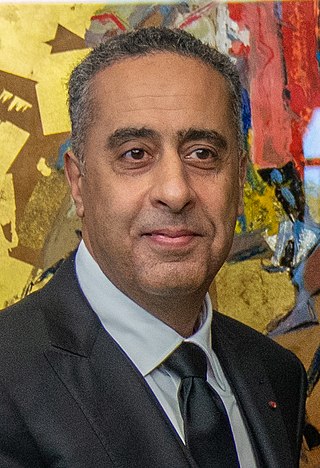
The Directorate-General for External Security is France's foreign intelligence agency, equivalent to the British MI6 and the American CIA, established on 2 April 1982. The DGSE safeguards French national security through intelligence gathering and conducting paramilitary and counterintelligence operations abroad, as well as economic espionage. It is headquartered in the 20th arrondissement of Paris.

The National Police, formerly known as the Sûreté nationale, is one of two national police forces of France, the other being the National Gendarmerie. The National Police is the country's main civil law enforcement agency, with primary jurisdiction in cities and large towns. By contrast, the National Gendarmerie has primary jurisdiction in smaller towns, as well as in rural and border areas. The National Police comes under the jurisdiction of the Ministry of the Interior and has about 145,200 employees. Young French citizens can fulfill their mandatory service in the police force.
A security agency is a governmental organization that conducts intelligence activities for the internal security of a nation. They are the domestic cousins of foreign intelligence agencies, and typically conduct counterintelligence to thwart other countries' foreign intelligence efforts.

Law enforcement in France is centralized at the national level. Recently, legislation has allowed local governments to hire their own police officers which are called the police municipale.
The Organization of Young Free Algerians was a pro-government armed group that claimed credit for various attacks against civilians who sympathised with the Islamists during the Algerian Civil War. It was active mainly in 1994 and 1995. However, it was a front under which elements of the DRS, the Algerian security services, operated. OJAL never existed as an independent organisation.

Ange Mancini is the French intelligence national coordinator.
The Direction Centrale des Renseignements Généraux, often called Renseignements Généraux (RG), was the intelligence service of the French National Police, answerable to the Direction Générale de la Police Nationale (DGPN), and, ultimately, the Ministry of the Interior. It was also in charge of the monitoring of gambling places and horse racing ranges.
The Bureau Central de Renseignements et d'Action, abbreviated BCRA, was the World War II-era forerunner of the SDECE and DGSE, the French intelligence services. It was created by Charles de Gaulle in 1940 as a Free French intelligence system that combined both military and political roles, including covert operations, though this policy was reversed in 1943 by Emmanuel d'Astrier (1900-69), who insisted on civilian control of political intelligence. The Bureau was first commanded by Major André Dewavrin, who had taken the nom de guerre "Colonel Passy", while journalist Pierre Brossolette (1903-44) headed the civilian-arm.
The Deuxième Bureau de l'État-major général was France's external military intelligence agency from 1871 to 1940. It was dissolved together with the Third Republic upon the armistice with Germany. However the term "Deuxième Bureau", like "MI6" and "KGB", outlived the original organization as a general label for the country's intelligence service.

Joseph Joanovici was a French scrap metal merchant who supplied Nazi Germany and funded the French Resistance with the proceeds during the German occupation of France in World War II.

The General Directorate for Internal Security is a French security agency. It is charged with counter-espionage, counter-terrorism, countering cybercrime and surveillance of potentially threatening groups, organisations and social phenomena.

Bernard Squarcini is a French intelligence official and security consultant. He was born on 12 December 1955 in Rabat, Morocco. He was the youngest Inspector General of Police.
Jean Burger, alias "Mario", was a member of the French Resistance during World War II. A member of the French communist party, he was born in Metz on 16 February 1907 and died at the Mittelbau-Dora concentration camp on 3 April 1945.

Abdellatif Hammouchi is the head of the Moroccan national police directorate, the General Directorate for National Security or DGST as well as head of secret services, the General Directorate for Territorial Surveillance or DGST.

The General Directorate for Territorial Surveillance, is the civilian domestic intelligence service of Morocco. It is tasked with the monitoring and anticipation of potentially subversive domestic activities.

Pierre de Bousquet de Florian was the head of the newly formed French National Centre for Counter Terrorism, an agency charged with monitoring and preventing terrorism in France, from the agency's establishment in 2017 to before being succeeded by Laurent Nuñez in 2020. Bousquet also headed the Direction de la surveillance du territoire from 2002-2007. Since leaving public service he has moved into the private sector in a senior advisory role at a consultancy firm.
Operation Blue Bird was a mission carried out by France's foreign intelligence service, the SDECE, in 1956 during the second year of the Algerian War of Independence. Its aim was to turn several hundred Kabyle people against the Algerian resistance known as the National Liberation Front (FLN), with the hopes of creating a clandestine counter-resistance force. These Kabyle fighters were known as Force K.

Yves Bonnet is a senior French civil servant and politician. He was prefect and director of the DST from 1982 to 1985. A member of the UDF, he served as deputy for the unified party from 1993 to 1997, before joining the National Rally during the regional elections of 2021.











